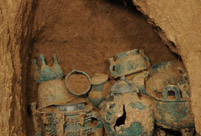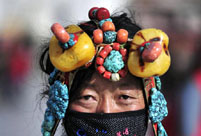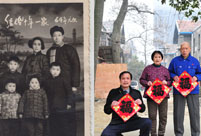 Deng Xiaoping: 'I have a clear conscience all my life'
Deng Xiaoping: 'I have a clear conscience all my life'
 Xi Jinping: 'The people are our strength'
Xi Jinping: 'The people are our strength'
 Amazing cliff diving in cold winter
Amazing cliff diving in cold winter
 Enjoy Sochi 2014 in slow motion
Enjoy Sochi 2014 in slow motion
 University student sentenced to death for poisoning roommate
University student sentenced to death for poisoning roommate
 Chinese lunar New Year celebrated in San Francisco
Chinese lunar New Year celebrated in San Francisco
 Taiwan Lantern Festival 2014
Taiwan Lantern Festival 2014
 Haiyang Yangge: make up
Haiyang Yangge: make up
 China's top 10 richest cities
China's top 10 richest cities
BEIJING, Feb. 24 -- The world's largest human migration came to an end on Monday, the last day of China's 40-day bittersweet travel period.
As many as 3.6 billion trips were made during "chunyun" this year, the travel period around the Spring Festival, which started on Jan. 16.
About 266 million train trips were made, up 12 percent from a year ago. Journeys by road, air and water stood at 3.26 billion, 44.07 million and 42 million respectively, said the Ministry of Transport (MOT).
Meanwhile, the battle for tickets and traffic jams caused anxiety for many.
TRAFFIC DILEMMA
Ticket shortages are a common occurrence during chunyun. Official data showed that more than 90 million tickets were on sale each day during the the travel period.
The peak fell on Feb. 6, the last day of the Spring Festival holiday, when a record 8.36 million railway trips were made, the ministry said.
Cai Tuanjie, director of the MOT's chunyun office, said it was difficult for people to get back home because of the vast number of passengers.
Overcrowding in the richer east and south areas led to ticket shortages, Cai added.
Constructing more railways, roads and having more air routes would be a waste of resources when chunyun has ended. Xu Yahua, deputy director of the MOT's road transport department, said it would not blindly provide more capacity.
GROWING PAINS
This year's 3.6 billion trips set a new record.
Since the reform and opening up, migrant workers have shaped chunyun. There were 500 million trips in 1984, 1 billion in 1994, over 2 billion in 2006, and more than 3 billion in 2012.
"The surge in the number of trips demonstrated the country's ongoing urbanization," said Liu Xiaoming, director of Beijing Municipal Commission of Transport.
Professor Xu Guangjian with Renmin University of China said that chunyun mirrors the country's development pace.
"Higher living standards mean more people, especially migrant workers, can cover their tickets home," said Zhou Tianyong, a professor with the Party School of the Central Committee of CPC.
INTEGRATED SOLUTION
Yang Chuantang, head of the MOT, said travel during chunyun can be improved. He said road, railway, water and air information needs to be coordinated better, and possibly integrated.
Zhou said traffic information, like train schedules and ticket prices, should be released by the ministry in advance.
Analysis showed that most of the trips covered short and medium distances. Passengers having shorter journeys could travel on roads to ease the pressure on the railways, Yang said.
He also said attracting private funds could help ease the country's stressed railway system.
 Chinese Dream: the Chinese Spirit and the Chinese Way
Chinese Dream: the Chinese Spirit and the Chinese Way 51 bronze sacrificial utensils unearthed in Shaanxi
51 bronze sacrificial utensils unearthed in Shaanxi Most gorgeous female celebs in Chi-pao
Most gorgeous female celebs in Chi-pao Second round of test kicks off at Beijing Film Academy
Second round of test kicks off at Beijing Film Academy Ancient Qiang people had vertically grown teeth
Ancient Qiang people had vertically grown teeth Top 10 Chinese youth’s favorite seaside destinations
Top 10 Chinese youth’s favorite seaside destinations Traditional Tibetan clothing tailors
Traditional Tibetan clothing tailors In photos: Unveiling Taishan station
In photos: Unveiling Taishan station Beautiful moments of family reunion
Beautiful moments of family reunion Chinese warplanes C919 to appear at Singapore Airshow
Chinese warplanes C919 to appear at Singapore Airshow Ruins of Shang Dynasty's structure unearthed in Shaanxi
Ruins of Shang Dynasty's structure unearthed in Shaanxi  Intercity high speed train in operation
Intercity high speed train in operation Severe coldness freezes large parts of China
Severe coldness freezes large parts of China  Beautiful moments of Sochi
Beautiful moments of Sochi  It's not just performing this year
It's not just performing this yearDay|Week|Month